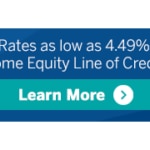The difference between a HELOC and Home Equity Loan
Home equity loans and home equity lines of credit are very similar financial tools, used by homeowners with a need for a quick source of funding.

The similarities between the two loans lies in the way they are secured, with the equity a borrower has built in their home representing the collateral. When it comes to which one you should choose, it’s important to consider your own financial situation, and why you might need a loan. Let’s take a look at the basics of each, then take a look at what makes them different.
Home Equity Loan
A home equity loan is a lump sum of money that a borrower applies for from a lender. How much the borrower may receive depends on the loan-to-value (LTV) ratio and, similar to many other types of loans, their income and credit history. Home equity loans have fixed interest rates, monthly payments and terms.
Home Equity Line of Credit (HELOC)
A HELOC is a line of credit that revolves – similar to a credit card – and can be used for large expenses, unexpected expenses, home remodeling, debt consolidation(1) or the like. Like a credit card, each time you repay some or all of the money used from the HELOC, your credit line is correspondingly replenished.
A HELOC is a secured loan in that you are borrowing against the equity that has been built in your house. Typically, lenders will let you borrow from 80 to 95 percent of your home’s equity.
When you obtain a HELOC, you are given a draw period, or length of time during which your line of credit will stay open. Draw times typically average 10 years. After the draw period is over, you enter into the repayment period, which can be anywhere from 10 to 20 years.
Differences between a Home Equity Loan and HELOC
An obvious difference between a home equity loan and HELOC is how you receive the money. With a home equity loan, you get one lump sum, while with a HELOC, you have a line of credit that stays open for 10 years and that you can draw on as needed.
A second difference between is the two is the interest rate the borrower pays. For a HELOC, similar to a credit card, the rate is typically variable, and based on the prime rate, which is set by the Federal Reserve. Because of this, it can move up or down. In a Home Equity Loan, the rate is fixed, which means it never changes and the borrower can expect to pay the same amount each month for the duration of the repayment period.
Repayment of the loans is another key difference. As mentioned, home equity loans are typically repaid for a set time period, with a monthly payment that combines principal and interest, and doesn’t change. Once a borrower has been approved for a HELOC, the draw period begins. During this time, any money borrowed from the line of credit is repaid each month by interest only payments, which may mean a lower monthly payment. When the draw period is over, the borrower moves to the repayment period, during which time the monthly payment begins to include principal plus interest for any money borrowed, meaning the monthly payment may increase from what it was during the draw period. If the variable rate changes, the monthly payment may again increase.
BBVA Compass offers a variable rate HELOC with a fixed rate component, where customers with an existing HELOC can opt to lock in up to three portions of their line of credit at a fixed rate. Find out more here.
What to choose
When looking at the option that is right for your unique financial situation, it’s important to consider what you need the loan for - is it something that you know you’ll need a specific amount of money? If so, a home equity loan may be what you need. Are you making home improvements, but not sure how much they will cost? You might want to consider a HELOC.
To read three reasons why BBVA Compass Director of Mortgage and Home Equity Originations Jose Pascual might consider a HELOC, click here.
For options offered by BBVA Compass for home lending, click here. Finally, for a special limited time offer from BBVA Compass for a HELOC, click here.
1. Debt Consolidation: The relative benefits you receive from loan consolidation will vary depending on your individual circumstances. If your Home Equity Loan has a longer term than the bills you are consolidating, you may not realize savings over the entire terms of your Home Equity Loan or Line.
